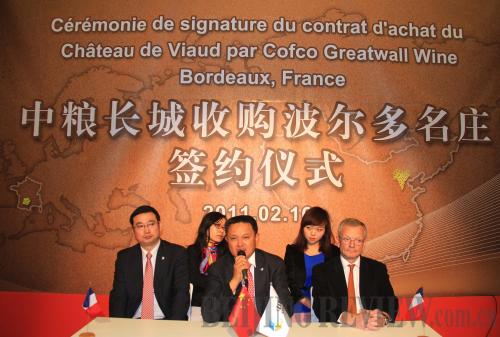|
 |
|
CHINESE BUYER: COFCO, China's leading foodstuffs import and export group, announces its acquisition of the Château de Viaud in Bordeaux, France on February 16, 2011. With the acquisition, COFCO becomes the first Chinese wine dealer to purchase a Bordeaux winery (LI MING) |
Lessons
We can learn a few lessons from South Korea's Daewoo Group. Its over-reliance on debt once helped its rapid expansion, but finally led to its collapse.
At its peak, Daewoo was South Korea's second biggest conglomerate with business revenue accounting for 10 percent of the national GDP. When its founder Kim Woo Choong launched large-scale global expansion in 1993, Daewoo had 150 overseas subsidiaries. By 1998, this number swelled to more than 600. That is to say, Daewoo opened a new overseas company every three days. From 1992 to 1998, Daewoo invested in 55 companies in China.
When a financial crisis broke out in South Korea at the end of 1997, most companies began drawing back. But Daewoo was still aggressively on the move abroad. By June 1999, Daewoo had $9.94 billion in foreign debt and around $60 billion in domestic debt. Its debt ratio reached 335 percent. In mid-July 1999, Daewoo's debt crisis broke out, causing a slump of Seoul's stock market and a depreciation of the South Korean won. Fears abounded that Daewoo's debt problem would touch off another financial crisis in the country. Finally, Daewoo Group went bankrupt.
Daewoo was not the only enterprise to seek aggressive expansions when the South Korean won continued to appreciate in the 1990s. The 1997 financial crisis in Southeast Asia pushed the country's balance of payment and reserve assets to the brink. In December 1997, official statistics showed South Korea's foreign exchange reserves only stood at $24 billion, but in fact, the usable amount was merely $6 billion. This is because South Korean banks deposited foreign reserves at their overseas branches. These branch banks lent the deposits to South Korea's domestic and overseas companies, which eventually turned into bad loans during the crisis.
Suggestions
For China, it is reasonable for the country to loosen its control on enterprises' overseas borrowing, but the laissez-faire approach, obviously, is too risky.
Chinese companies should not expect the yuan to keep appreciating and the lower interest rates of U.S. dollars and other major foreign currencies to last forever. China's International Investment Position 2010 showed its liabilities in portfolio investment totaled $221.6 billion at the end of 2010, and direct investment by other countries or regions in China totaled $1.47 trillion. Theoretically, it is possible for foreign investors to withdraw their retained earnings in a short time, so we cannot exclude the possibility speculative money abroad may hit China and lead to a financial crisis similar to the one in South Korea in 1997-98.
In my view, China's ODI should be cooled down. But it does not mean China should immediately withdraw incentives or its ODI will witness a dramatic decrease. On the contrary, I believe our ODI will make progress over the long term and the growth process will be marked by ups and downs.
There is no need to tighten overall ODI policies right now, but we should slow down the pace of issuing new incentives. In addition, different policies should be taken for different types of ODI. |
